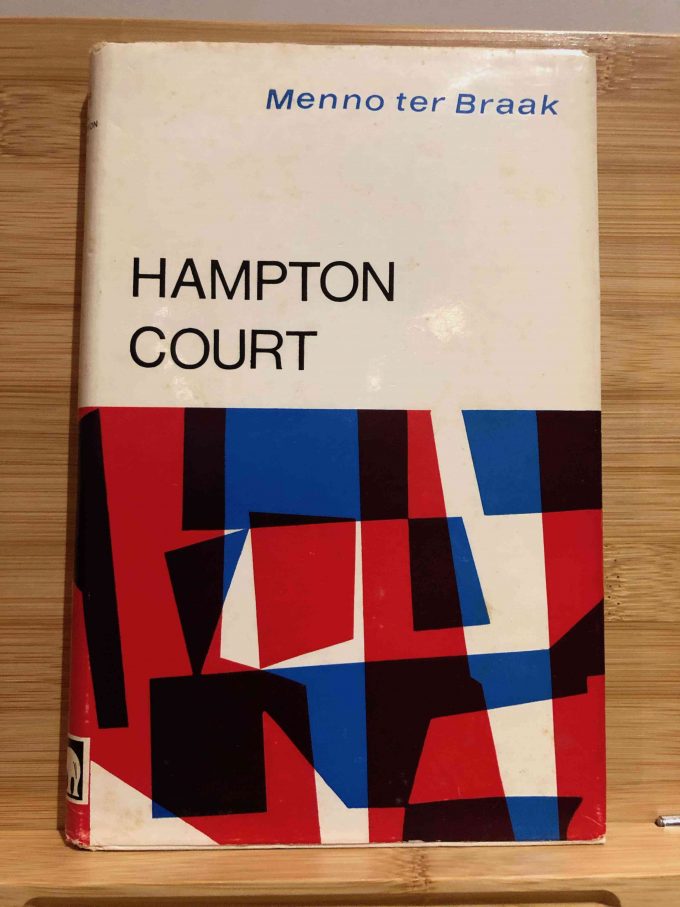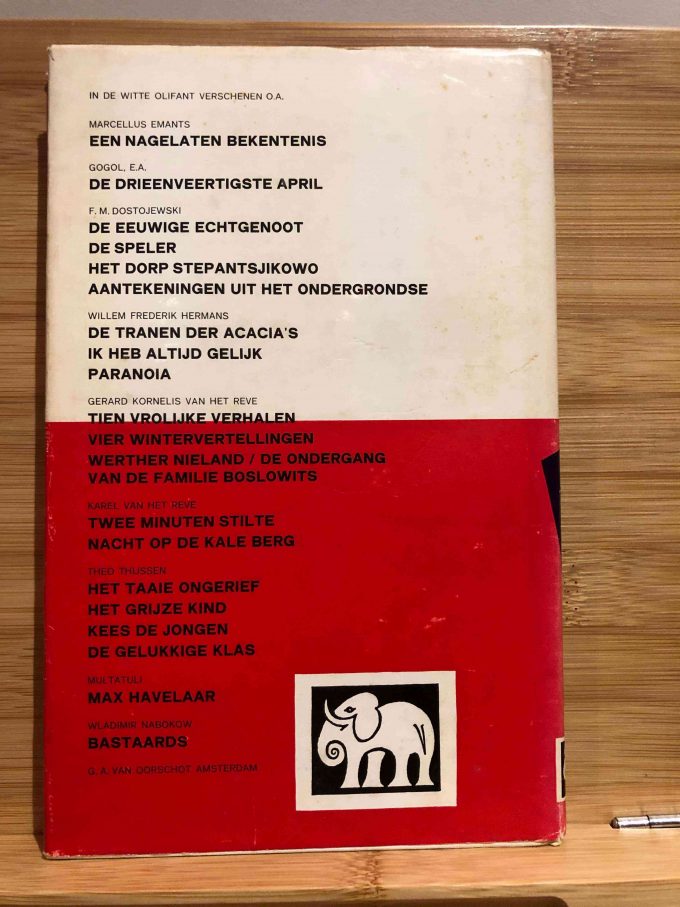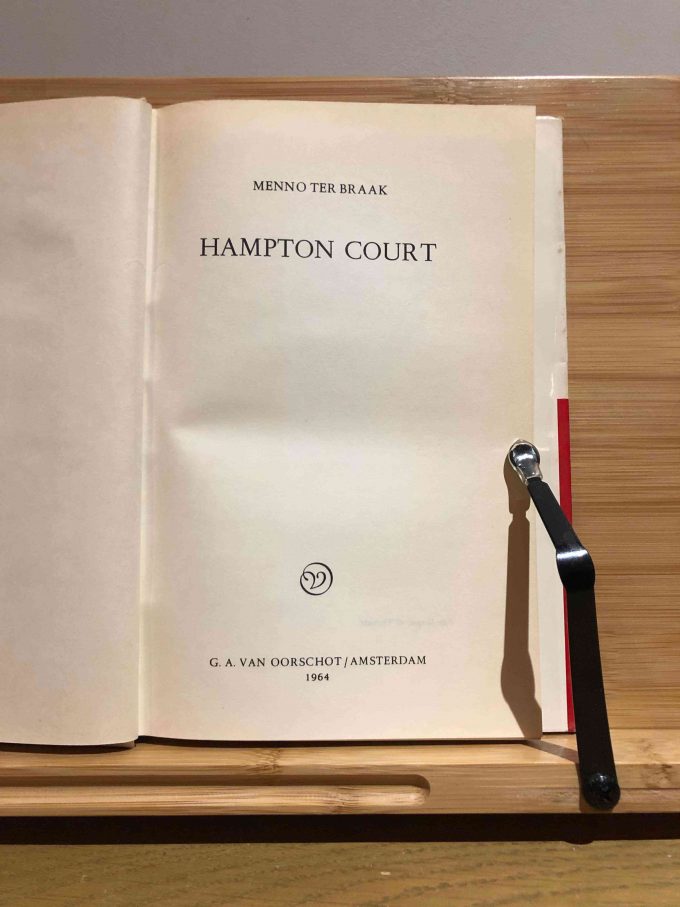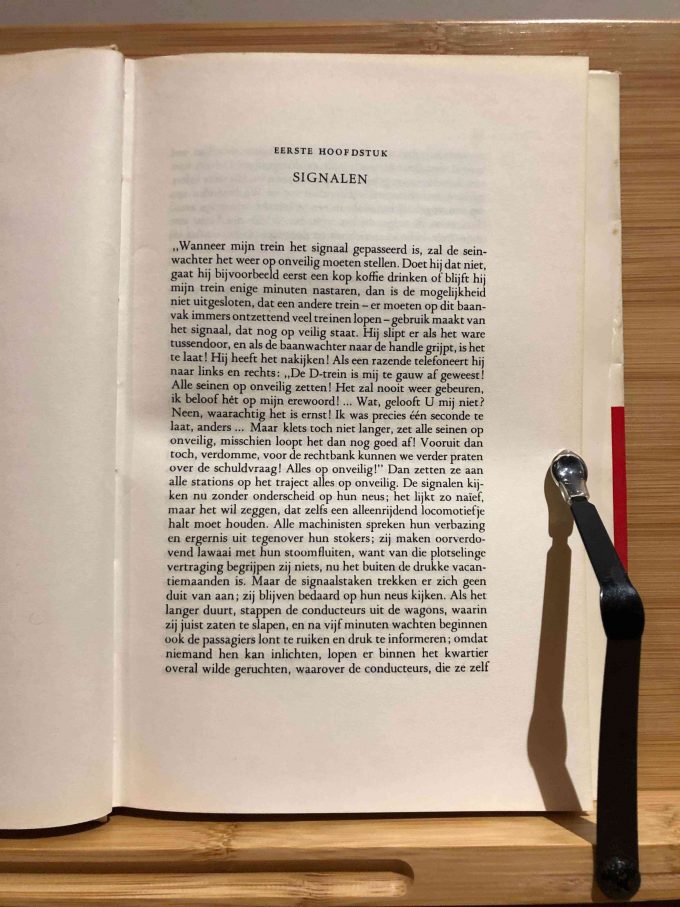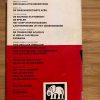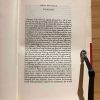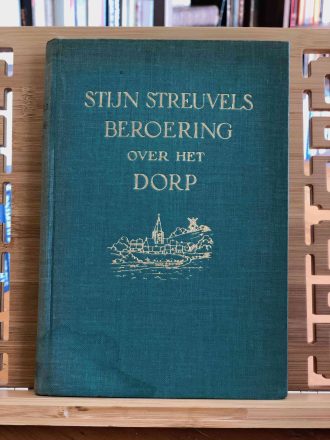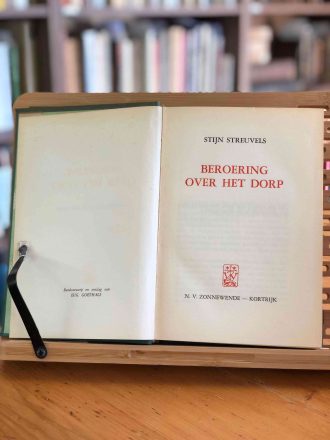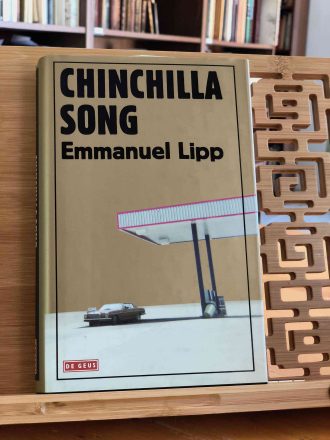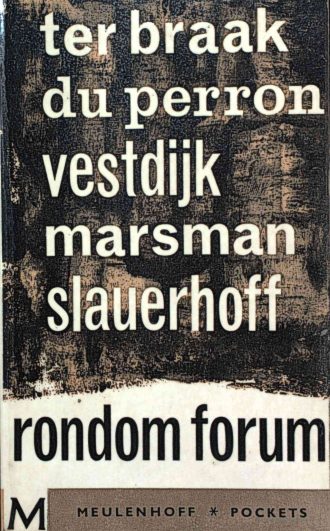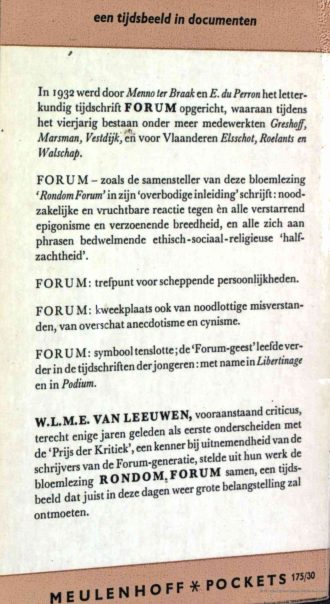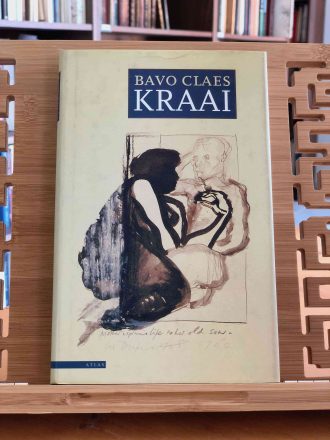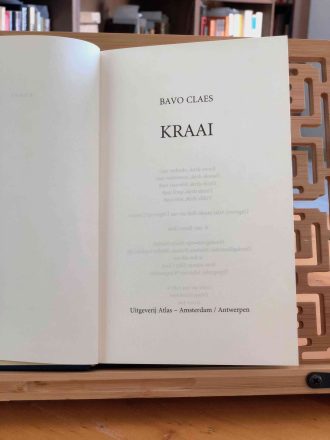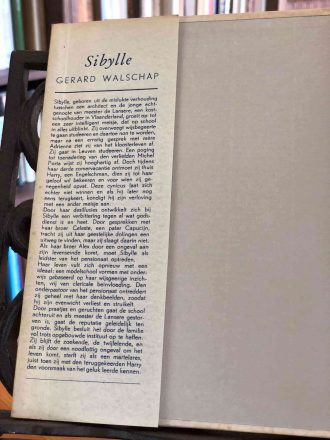Nederlands
Hampton Court (1931) door Menno ter Braak is een roman die de worsteling van de protagonist Andreas Laan met leegte en vervreemding onderzoekt. Uitgegeven door G. A. Van Oorschot in 1964 als deel van de Witte Olifant-reeks, bevat deze uitgave 145 pagina’s en geeft een diepgaand inzicht in de psychologische en filosofische kwesties waarmee de protagonist geconfronteerd wordt. De roman, met een hardcover en stofomslag, weerspiegelt Ter Braaks scherpe analyse van de menselijke natuur en maatschappelijke conventies.
De titel Hampton Court verwijst naar een cruciale scène in de debuutroman van Ter Braak, Het carnaval der burgers(1930), waarin Andreas Laan overweldigd wordt door een gevoel van leegte en vervreemding in de tuin van Hampton Court Palace. Deze ervaring zet een reeks gebeurtenissen in gang die Andreas dwingt zijn leven opnieuw te evalueren en zijn relatie tot de wereld te herzien. Geconfronteerd met deze existentiële crisis, vlucht Andreas in paniek en verbreekt vervolgens zijn verloving bij zijn terugkeer naar Nederland.
De roman begint met Andreas’ terugkeer naar de schijnbare veiligheid van het ouderlijk huis, waar hij zoekt naar houvast en stabiliteit. De regelmaat en geborgenheid van zijn ouderlijk huis bieden echter slechts tijdelijke troost. Tijdens Koninginnedag ontmoet Andreas Van Haaften, een intellectueel en hooghartige cynicus, die een belangrijke invloed op zijn verdere ontwikkeling zal hebben. Van Haaften, een alter ego van Ter Braak zelf, vertegenwoordigt een morele en intellectuele uitdaging voor Andreas. Aanvankelijk voelt Andreas ontzag voor Van Haaften, maar dit verandert wanneer hij hem betrapt tijdens een vrijpartij met zijn voormalige verloofde, Eline.
De ontdekking van Van Haaften’s hypocrisie ontneemt Andreas zijn laatste illusies over de schijnbare authenticiteit van de mensen om hem heen. Hij komt tot de conclusie dat de wereld een schouwtoneel is waarop niets is wat het lijkt, en dat het belangrijk is om trouw te blijven aan zichzelf, ongeacht de maatschappelijke verwachtingen en normatieve structuren. Dit inzicht leidt Andreas naar een dieper zelfbewustzijn en een kritische houding tegenover de burgerlijke waarden die hij voorheen kritiekloos had aanvaard.
Ter Braak gebruikt de roman als een middel om zijn eigen filosofische en culturele ideeën te verkennen. Hampton Court is doordrenkt met thema’s van existentialisme en de zoektocht naar authenticiteit, waarbij Ter Braak’s scherpe observaties en kritische blik op de samenleving duidelijk naar voren komen. De roman biedt een diepgaande reflectie op de menselijke conditie en de spanningen tussen persoonlijke integriteit en sociale conformiteit.
Menno ter Braak’s schrijfstijl in Hampton Court is zowel introspectief als beschouwend, waarbij hij gebruik maakt van rijke symboliek en filosofische reflectie om de innerlijke wereld van Andreas en de maatschappelijke druk die hem omringt te onthullen. Zijn vermogen om complexe psychologische en filosofische thema’s te verkennen, maakt deze roman tot een belangrijk werk in de Nederlandse literatuur.
Menno ter Braak (1902-1940) was een invloedrijke Nederlandse schrijver, essayist en cultuurcriticus, die een belangrijke rol speelde in de literaire en intellectuele wereld van het interbellum. Geboren in Eibergen, Gelderland, was Ter Braak medeoprichter van het invloedrijke literaire tijdschrift Forum samen met E. du Perron en Maurice Roelants. Hij was een vooraanstaand criticus van het opkomende nationaalsocialisme en pleitte voor een kritische en onafhankelijke houding van intellectuelen. Ter Braak geloofde sterk in de kracht van literatuur en cultuur als middelen om maatschappelijke en filosofische kwesties te verkennen. Zijn werk wordt gekenmerkt door een scherpe analyse van de menselijke natuur en de maatschappelijke structuren die het individuele leven beïnvloeden. In mei 1940, na de capitulatie van het Nederlandse leger aan de nazi’s, pleegde Ter Braak zelfmoord, vastbesloten om niet onder een nazi-regime te leven.
English
Hampton Court (1931) by Menno ter Braak is a novel that explores the protagonist Andreas Laan’s struggle with emptiness and alienation. Published by G. A. Van Oorschot in 1964 as part of the Witte Olifant (White Elephant) series, this edition contains 145 pages and provides a profound insight into the psychological and philosophical issues faced by the protagonist. The novel, with a hardcover and dust jacket, reflects Ter Braak’s keen analysis of human nature and societal conventions.
The title Hampton Court refers to a crucial scene in Ter Braak’s debut novel, Het carnaval der burgers (The Carnival of the Citizens) (1930), where Andreas Laan is overwhelmed by a sense of emptiness and alienation in the gardens of Hampton Court Palace. This experience sets off a chain of events that force Andreas to reevaluate his life and his relationship with the world. Confronted with this existential crisis, Andreas flees in panic and breaks off his engagement upon his return to the Netherlands.
The novel begins with Andreas’ return to the apparent safety of his parental home, where he seeks stability and reassurance. The routine and comfort of his childhood home, however, offer only temporary solace. During Queen’s Day celebrations, Andreas meets Van Haaften, an intellectual and haughty cynic, who has a significant influence on his further development. Van Haaften, an alter ego of Ter Braak himself, represents a moral and intellectual challenge for Andreas. Initially, Andreas feels awe towards Van Haaften, but this changes when he catches him in an affair with his former fiancée, Eline.
The discovery of Van Haaften’s hypocrisy shatters Andreas’ remaining illusions about the apparent authenticity of the people around him. He concludes that the world is a stage where nothing is what it seems, and that it is crucial to remain true to oneself, regardless of societal expectations and normative structures. This realization leads Andreas to deeper self-awareness and a critical stance towards the bourgeois values he had previously accepted uncritically.
Ter Braak uses the novel as a vehicle to explore his own philosophical and cultural ideas. Hampton Court is imbued with themes of existentialism and the quest for authenticity, with Ter Braak’s sharp observations and critical view of society clearly evident. The novel offers a profound reflection on the human condition and the tensions between personal integrity and social conformity.
Menno ter Braak’s writing style in Hampton Court is both introspective and contemplative, using rich symbolism and philosophical reflection to reveal the inner world of Andreas and the societal pressures surrounding him. His ability to explore complex psychological and philosophical themes makes this novel an important work in Dutch literature.
Menno ter Braak (1902-1940) was an influential Dutch writer, essayist, and cultural critic who played a significant role in the literary and intellectual world of the interwar period. Born in Eibergen, Gelderland, Ter Braak co-founded the influential literary magazine Forum with E. du Perron and Maurice Roelants. He was a prominent critic of the rising National Socialism and advocated for a critical and independent stance among intellectuals. Ter Braak believed strongly in the power of literature and culture as tools to explore social and philosophical issues. His work is characterized by a sharp analysis of human nature and the societal structures that shape individual lives. In May 1940, following the capitulation of the Dutch army to the Nazis, Ter Braak committed suicide, determined not to live under a Nazi regime.
